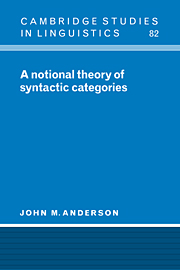2 - Fundamentals of a notional theory
Published online by Cambridge University Press: 14 August 2009
Summary
‘Tell Mrs. Musto I'm concentrating on words. The Word. But also words that are just words. There's so many kinds. You could make necklaces…’
In this chapter I am concerned to set out the basic properties of one approach to the development of a notional theory of syntactic categories, primary and secondary. Chapter 3 elaborates further the properties of verbal and nominal words and constructions; and there, too, I shall attempt to show more generally and precisely that the notional characterisations of the various categories form the basis for the assignment of syntactic and morphological structure. Here I propose as the content of syntactic categories a set of notional features whose distribution through the set of categories identifies these categories cross-linguistically, and I begin to sketch the syntactic consequences of the categorisations. I shall also try to show in a preliminary way that this distribution of features correlates with the typical associations between primary and secondary categories (such as verb and Tense) and the recurrent syntactic relations into which the primary categories enter; again these are explored more fully in the chapter which follows. These recurrences provide powerful support for the hypothesis of a notionally based grammar.
Information
- Type
- Chapter
- Information
- A Notional Theory of Syntactic Categories , pp. 13 - 145Publisher: Cambridge University PressPrint publication year: 1997
